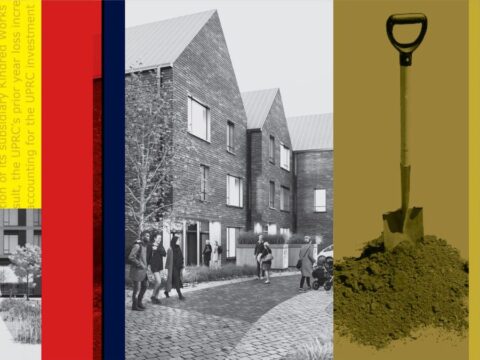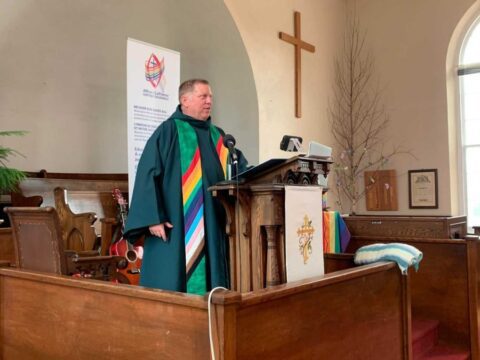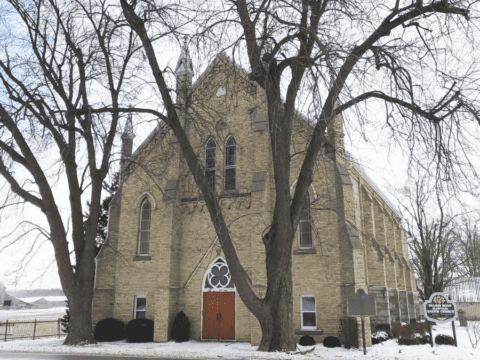The United Church has suspended new applications from “admission ministers” — those hoping to transfer from other denominations, often also from other countries — in an effort to help unemployed racialized clergy find jobs.
“Please note that we are not currently receiving new applications for admission ministry,” the board of vocation has posted on The United Church of Canada’s website.“Due to an abundance of qualified ministers approved by The United Church of Canada currently seeking calls, the board of vocation is not currently receiving new applications.”
There are 173 United Church congregations searching for a minister. Currently, 53 admission ministers are approved and searching for a congregation to accept them.“There are no white ministers currently in the admission process who are without jobs in The United Church of Canada,” Rev. Marlene Britton, director of policies and programs for ministry personnel for The United Church of Canada, wrote in an email.Another 63 are waiting to be approved by the admission board so they can join the list of ministers available for appointment.
You may unsubscribe from any of our newsletters at any time.
More than half of the admission ministers are racialized and from other countries, Rev. Marlene Britton, director of policies and programs for ministry personnel for The United Church of Canada, wrote in an email.
“There are no white ministers currently in the admission process who are without jobs in The United Church of Canada,” she added.
Too few churches are willing to accept a racialized minister or one from a different culture, Britton said in an interview. She herself is an admission minister from Jamaica who joined the United Church in 2013 from the Methodist Church in the Caribbean and the Americas.
The United Church has had a process for ministers of many other denominations to join its ministry for about 20 years, Britton said. Candidates must be fully ordained ministers in a denomination recognized by the World Council of Churches. They must be in “basic agreement” with the United Church’s doctrine, although many are referred to courses to bring them up to speed, she said.
Rev. Paul Douglas Walfall is familiar with the process of becoming an admission minister. He is Jamaican but was serving in Barbados, a minister in the Methodist Church in the Caribbean and the Americas, when he started the application process in 2009.
Douglas Walfall sent out 80 applications to Canadian United churches after he had been approved as an admission minister. Only three responded. One said there was a problem with immigration, which Douglas Walfall says is not true. One said he was not an actual United Church minister. Also not true, says Douglas Walfall.
One said it was too expensive to bring him to Canada. Also not true, as the candidate covers the cost of travel to Canada, he said. “But who is there to tell the congregation that? So they get away with it.”
More on Broadview:
- Why this religious leader says white Christians must confront racial injustice in church
- Black immigrants find belonging and community in faith spaces
- Clergy protest United Church’s decision to elevate designated lay ministers’ authority to the same level as ordained ministers
Since his arrival as a United Church of Canada minister in 2011 — he is now with Pilgrim United in Edmonton — he has heard many excuses for why United churches in Canada do not want an admission minister.
He’s heard congregations say they “don’t want anyone with a ‘strange accent.’”
“You hear horror stories of what admission ministers go through,” Douglas Walfall said. “One was told [by a congregant] not to complain because ‘This is better than where you come from.’”
Douglas Walfall said his experience of coming to Canada has had points of joy but also times when people have been cruel. Sometimes he has found himself thinking, “What have I brought on myself?”
“The church is part of the wider culture.…There is a backlash, a pushback,” against newcomers from different cultures, he said.
“The United Church needs to be honest. There’s a high degree of being nice and smiling, but it’s not being honest.…They say your gifts are welcome, but that is not necessarily so. It’s, ‘This is our way of doing things,’ and you are expected to adapt.”
Britton said pausing applications for admission ministry is a temporary move. She is hopeful the United Church will be able to convince congregations to accept admission ministers. The church has held two virtual open houses to try to match churches with admission ministers. The first one was so well attended they turned people away because the number of attendees exceeded their Zoom capacity, she said. The church also plans to engage an immigration lawyer to help ministers and churches navigate the immigration process.
So far, Newfoundland and Labrador churches have accepted several admission ministers. “They are great at nurturing ministers who come from other countries,” Britton said. Manitoba also has done well with accepting admission ministers.
General secretary Rev. Michael Blair said the program started about the time Korean ministers were coming to Canada to serve the Korean United Church congregations. Admission ministers “now want to serve in the wider church,” he said.
Many admission ministers end up waiting as long as seven years to be hired by a congregation after they’ve been accepted as an admission minister, Blair said. The church realizes this is a problem, and he said they have made “a genuine commitment to explore” the matter. He is to develop a plan and a process to study the culture of the church, create appropriate policies to continue to educate the congregations and report back to the church by November.
***
Julie Carl is Broadview’s United Church in Focus Editor.















Hi Jocelyn Bell,
Thank you for this insightful article. I have being in the admissions process of United Church of Canada since May 2022.
Numbers of community of faith have interviewed me but feedback from them have always appreciated my presentation, credentials and personal profile but otherwise they’ve taken another direction or another candidate has been chosen.
In the time past have written office of vocation to help look into this.
With God on my side, my years of ministerial experience and qualifications I can lead a congratulation to the next transition level.
I am open for learning and ready to acclamatized to any environment I meet myself.
United Church of Canada should help us through this admission process.
Best Regards,
The Rev’d Olusegun Akindele
Nigeria
+2348024955261
I do not dispute that racialized ministers noticeably have more difficulty securing Calls and Appointments than white ministers. I have listened to a previous minister of my home congregation, as well as other colleagues, who have faced those challenges. And I agree, they are often “horrible in their politeness”. However, I also have the experience with some colleagues who have been admissions candidates that they are significantly more conservative theologically than some congregations are willing to accept. That may be influenced by cultural or ethnic traditions (including living in a colonial context), or it might be that they are simply persuaded by more conservative ideas. It isn’t always a case of being refused because they are racialized.H
We are in need of a minister.
If we could share with a couple of other rural communities that would be great.
Dear Jennie Reynolds,
I am a parish minister who has worked with children and families and let me know if you’re still looking for a minister. Blessing, Rev. Bonnie Tarwater, (855) 248-5123, revtarwater@yahoo.com